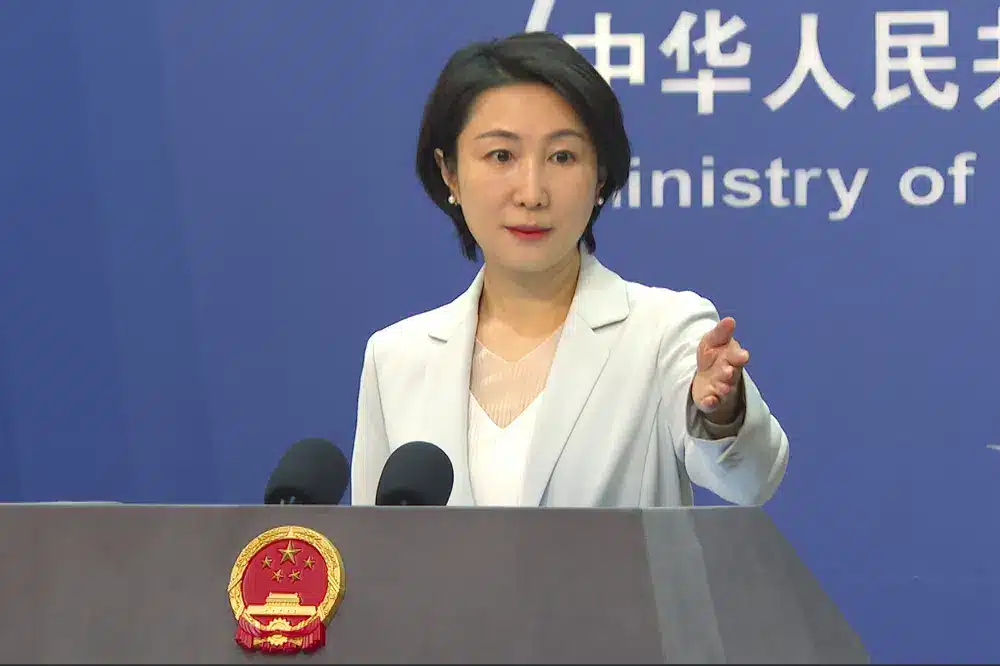Computer
China Defends Ban On US Chipmaker Micron in 2023

BEIJING, China – The Chinese government defended its restriction on using components from US memory chipmaker Micron Technology Inc. in some computer systems on Wednesday after Washington raised concern, escalating tensions over technology and security.
The security examination of Micron products was “conducted in accordance with the law,” according to Mao Ning, a foreign ministry official.
On Sunday, the Chinese Cyberspace Administration stated that Micron goods pose unspecified security threats but provided no further details. It barred them from using computers that handled sensitive data.
This came after the United States, Japan, and the Netherlands barred China’s access to advanced processor chip technology on security grounds, at a time when the governing Communist Party is threatening to attack Taiwan and is becoming more belligerent towards its Asian neighbors.
“China’s cybersecurity review does not target any specific countries or regions,” Mao explained. “We do not exclude technologies and products from any country.”
Supply disruptions and missed sales revenue have harmed businesses on both sides.
Washington and its allies’ restrictions on access to chips and methods for making them deter China’s ambitions to create its semiconductor sector. Potential sales to Chinese smartphone makers, chip foundries, and other clients have cost US vendors billions.
The Chinese government defended its restriction on using components from US memory chipmaker Micron Technology Inc.
Mao said the US had put security limitations on over 1,200 Chinese enterprises “without any factual basis.” She accused Washington of exploiting national security to “unreasonably suppress Chinese companies.”
“This is economic coercion, and it is unacceptable,” Mao declared.
According to State Department spokeswoman Matthew Miller, the US administration is “engaging directly” with Beijing to “make our view clear” on the Micron embargo.
“We have very serious concerns,” Miller added. He stated of China, “This action appears inconsistent with the PRC’s assertions that it is open for business and committed to a transparent regulatory framework.”
According to Micron’s chief financial officer, Mark Murphy, the company would work with the Chinese authorities to assess the ban’s impact.
“We remain unclear as to what security concerns exist,” Murphy said during a JP Morgan technology industry conference call. “We have received no customer complaints about the security of our products.”
According to Murphy, Micron expects to lose sales similar to a single-digit percentage of total revenue, but the exact figure will depend on which customers and products are affected.
The Chinese government defended its restriction on using components from US memory chipmaker Micron Technology Inc.
Foreign Minister Qin Gang urged his Dutch counterpart on Tuesday for access to chipmaking technology that has been restricted for security reasons.
China requires a machine that uses ultraviolet light to etch minuscule circuits on next-generation chips and is only available from one Dutch manufacturer, ASML Holding NV. Without it, the ruling party’s aspirations to build semiconductors for cellphones, artificial intelligence, and other cutting-edge applications will be hampered.
“China has serious concerns about this,” Qin said. “We should work together to jointly protect the normal trade order between us” and “keep global industrial and supply chains stable.”
Wopke Hoekstra, the Dutch minister, stated that he “shared our national security concerns” but provided no indication that his government’s position had altered.
SOURCE – (AP)
Computer
Actor Ian McKellen, 85, Is In ‘Good Spirits’ And Expected To Recover From Fall Off Stage In London

LONDON — Actor Ian McKellen is expected to recover fully after falling from a London stage during a fight scene and being hospitalized, according to producers.
According to a representative for the Noel Coward Theatre production, McKellen, 85, was in “good spirits” after medics indicated a scan showed he was likely to recover completely following his fall on Monday night.
Ian Mckellen | AP news Image
Actor Ian McKellen, 85, Is In ‘Good Spirits’ And Expected To Recover From Fall Off Stage In London
According to producers, McKellen’s Tuesday performance was canceled, but he was anticipated to return to the stage on Wednesday.
The stage and screen veteran, who played Gandalf in the “Lord of the Rings” movie, yelled out in pain following the fall, according to a BBC correspondent at the theatre.
McKellen was cast as the rogue John Falstaff in “Player Kings,” a Robert Icke-directed dramatization of William Shakespeare’s two “Henry IV” history plays.
Ian Mckellen | AP news Image
Actor Ian McKellen, 85, Is In ‘Good Spirits’ And Expected To Recover From Fall Off Stage In London
McKellen lost his balance and fell off the stage in a scene with Toheeb Jimoh’s Prince Hal and Samuel Edward-Cook’s Henry Percy, which surprised the audience.
“Sir Ian seemed to trip as he moved downstage to take a more active part in the scene,” audience member Paul Critchley told the PA news agency, describing it as a surprise. “He picked up momentum as he moved downstage which resulted in him falling off the stage directly in front of the audience.”
Staff and two medics in the audience assisted the actor, according to a statement from the theatre.
The theatre was evacuated, and the play was canceled.
Ian McKellen | AP News Image
Actor Ian McKellen, 85, Is In ‘Good Spirits’ And Expected To Recover From Fall Off Stage In London
McKellen, who played Magneto in the “X-Men” films, is a well-known Shakespearean actor in Britain, having performed in Richard III, Macbeth, and King Lear.
He has received a Tony Award (for “Amadeus”), six Olivier Awards, and nominations for two Academy Awards, five Emmys, and several BAFTA awards.
SOURCE – (AP)
Computer
Aegis Space Law Helps Startups With Free Online Space Regulatory Calculator

Aegis Space Law is providing a free online Space Regulatory Calculator to help US businesses negotiate the complex regulatory landscape.
The Space Regulatory Calculator, which was unveiled on June 4, is intended to assist early-stage space companies in complying with space-related regulations issued by the Commerce Department, Federal Aviation Administration, Federal Communications Commission, National Oceanic and Atmospheric Administration, and the State Department.
“Aegis works with a lot of space startups,” Bailey Reichelt, Aegis Space Law’s partner and co-founder, told SpaceNews via email. “The common denominator is that they don’t consider regulations as something to plan for until they have the engineering and financing in place. Unfortunately, regulatory timelines can be significantly longer than other timelines.”
Reichelt, who developed the Space Regulatory Calculator with Aegis colleague Will Lewis, advises founders to consider regulatory permission as soon as they start designing space technology and seeking funds “to maximize the chances of that business succeeding.”
Costly mistakes
Failure to address regulations early in the planning process might result in costly and time-consuming mistakes. For example, a satellite company may choose a foreign antenna array based on its cost and ground-station compatibility, unaware that the operating frequency would entail “a lengthy and expensive regulatory burden,” Reichelt said.
Furthermore, federal acquisition regulations governing current contracts may prohibit the use of foreign-sourced components.
“This kind of setback happens all the time when you have no idea what regulations apply to you,” Reichelt stated.
Legal Advice
Traditionally, space corporations used attorneys to identify which restrictions related to their operations. Many new space enterprises cannot afford “the sophisticated legal advice required to navigate this many agencies,” Reichelt stated.
“This leaves companies vulnerable to missteps that can cost time and money.” Mistakes in regulatory compliance can potentially jeopardize the firm’s or mission’s viability, she said.
It is “entirely unreasonable for a company with no cash flow to spend tens of thousands of dollars on lawyers before they even have paid employees,” Reichelt stated.
“If we want the space industry to prosper, and the United States’ technological sector to continue leading innovation globally, we must lower legal and regulatory hurdles across the board.
The Space Law Calculator is intended to assist entrepreneurs in determining what kind of licenses and permissions they will require, how long the approval process will typically take, and what costs they will incur to assure regulatory compliance.
“A small business looking to launch its first satellite, for example, would see, among other things, that it may need to plan at least two years in advance to ensure required licenses are obtained prior to launch,” according to the announcement.
Aegis attorneys want to update the Space Regulatory Calculator when regulations change.
Attorneys from Aegis Space Law in Washington contributed to the formation of the nonprofit Association of Commercial Space Professionals. Additionally, Aegis attorneys teach at the Association’s Space Regulatory Bootcamp.
By Debra Werner
Debra Werner is a correspondent for SpaceNews based in San Francisco. Debra earned a bachelor’s degree in communications from the University of California, Berkeley, and a master’s degree in Journalism from Northwestern University. She… More by Debra Werner
Computer
Jennifer Lopez Cancels Summer Tour: ‘I Am Completely Heartsick And Devastated’

NEW YORK — The Associated Press was informed by Live Nation executives that Jennifer Lopez has canceled her 2024 North American tour.
They said, “Jennifer is taking time off to be with her children, family, and close friends.”

Jennifer Lopez | NBC News Image
Jennifer Lopez Cancels Summer Tour: ‘I Am Completely Heartsick And Devastated’
In support of her first solo album in ten years, “This Is Me… Now,” and its accompanying film, she was scheduled to embark on her first tour in five years.
The tour was supposed to begin in Orlando, Florida on June 26 and end in Houston on August 31.
Jennifer Lopez | AP News Image
Jennifer Lopez Cancels Summer Tour: ‘I Am Completely Heartsick And Devastated’
Those who bought tickets through Ticketmaster will receive an immediate refund, according to a statement from Live Nation.
On her OntheJLo website and newsletter, Lopez addressed the fans with the following statement: “I am completely heartsick and devastated about letting you down.” Please understand that if I didn’t think this was absolutely necessary, I wouldn’t have done it.

Jennifer Lopez | Billboard Image
Jennifer Lopez Cancels Summer Tour: ‘I Am Completely Heartsick And Devastated’
Her successful album “This Is Me… Then” was released twenty years ago, and this year, she released “This Is Me… Now.” According to Lopez, the new record is a “miracle” and “a second chance,” as she told the AP. And I wish I could freeze this instant in time the same way that album did.
SOURCE – (AP)
-
World2 weeks ago
Former President Trump Survives Being Shot at Pennsylvania Rally
-
Tech4 weeks ago
Huawei Launches 5G-A Pioneers Program at MWC Shanghai 2024: Paving the Way for a Connected Future
-
Sports4 weeks ago
NBA Draft: Kyle Filipowski Withdraws Unexpectedly From The First Round
-
Tech4 weeks ago
ChatGPT Answers Undiscovered Questions and Outperforms Students.
-
News4 weeks ago
US Supreme Court Rejects Drug Deal that Protects the Sackler Family
-
Health4 weeks ago
US Health Agency Issues Dengue Virus Infection Warning























